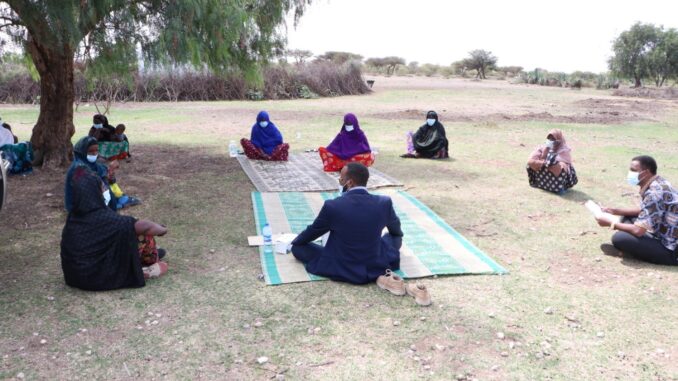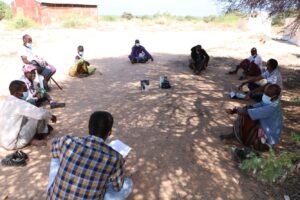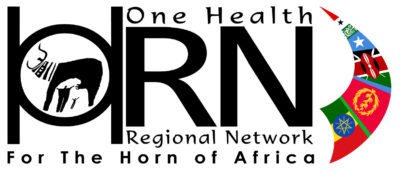
A team from IGAD Sheikh Technical Veterinary School (ISTVS), funded by the HORN project via our COVID Sandpit event in June 2020, describe the process they have been through, from attending the Sandpit event, receiving funding, to the progression of the study and the preliminary findings.
Team Involved in the Project
Based at ISTVS, the research team involved a range of people from multidisciplinary backgrounds, bringing together expertise in climate change, data scientists, two veterinary doctors and livestock expertise.
Before the Sandpit
Early in 2020 the HORN project put out a call for applications to attend one of their Sandpit events. The team drafted a proposal, but the emergence of the corona virus re-directed the attention to the global pandemic. To that end, HORN changed the focus of their Sandpit to COVID-19 so the team immediately formulated a novel research idea. We set up a meeting and discussed matters related to team leader and task division; organised all the necessary documents; and finally sent the complete application via the online portal. We were shortlisted and invited to participate at the event from the 1st – 5th June, 2020.
During the Sandpit
At the beginning of the Sandpit event the team were introduced to their mentors: Professor Eric Fevre (University of Liverpool, and ILRI, Kenya) and Professor Neil French (University of Liverpool). During the Sandpit, the group learnt a great deal from the programme’s presentations and interactions from different scientists and researchers in the regions. The two mentors contributed a lot towards birthing the idea, the development of the proposal, framing of the research questions, and further guidance on better ways of pitching the proposal. On the final day the team pitched their proposal to the funding panel and were awarded a small grant.
After the Sandpit
After the completion of Sandpit event, the team organised a meeting with their two mentors to discuss setting a work plan and further incorporating comments from the panel to our proposal. They selected three different geographical areas in Somaliland to conduct Focus Group Discussion and commenced field work. Findings of the first phase of the project are now out and under review for publication. The second phase of the survey data collection is currently resuming and the teams have already begun field work.
What is the study about?
The study, titled “Responding to COVID-19: The Case of Somaliland Pastoralist Society” is intended to assess how pastoralists responded to COVID-19 and recommends possible tailor-made measures which can be applied by pastoralists in Somaliland. It also aims to assess the knowledge of marginalised pastoralists on COVID-19 control measures, and the general attitude towards the pandemic, with further details on the challenges and opportunities related to the pandemic.
What are the preliminary Findings?
Pastoralists in Somaliland heard about the existence of COVID-19 through a number of sources: the BBC (British Broadcasting Corporation) in its Somali language division, from Mobile phones as a ring tone, and most importantly there were awareness campaigns carried out by relevant government agencies, local and international NGOs, and loudspeakers mounted on vehicles.

Somaliland pastoralists initially perceived COVID-19 as distant – the problem of others – and didn’t believe it was present in their local areas; however, as they are well connected by phones they soon received news that it was found in major towns in Somaliland such as Hargeisa, Burao and Borama.
Some of these pastoralists’ societies have already seen unprecedented flu symptoms; however, can’t be guaranteed that this is the disease or not due to lack of related facilities, such as testing machine, doctors for consultation, etc. Based on the results on assessing the knowledge and attitude, pastoralists have adequate information and background knowledge about the pandemic. This is associated with mass awareness campaign across the country.
The measures that Somaliland pastoralists are practicing are handwashing and social distancing, which are cross-cutting guidelines on both a national and global level. Among the recommended control measures, there are some which are not applicable in the pastoralist context, including face masks, gloves and physical distancing of infected people.
If someone in the pastoralist society develops similar signs and symptoms of COVID-19 infection, pastoralists would take the following steps:
- Contacting a health centre and sending the patient there
- Treating the patient with traditional remedy
- Building a new hut for the patient and then quarantining the patient
- Not to make contact with a sick person
- Practicing frequent handwashing in society
Even though the disease has not affected the human capital in livestock production areas directly, their livelihoods have been affected by the pandemic in several ways.
Firstly, the closure of export destination markets of livestock in the Middle East, most importantly Saudi Arabia, and cancelation of pilgrimage in 2020, where Somaliland exports millions of sheep, goats, camel and cattle annually, means reduced income for the pastoralists and liquidity challenges in the pastoralist areas.
Secondly, while the Somali diaspora are renowned for their ability to respond to crises in their country of origin and have been doing for decades, during the COVID-19 that remittance has dramatically reduced as diaspora communities become affected by lockdowns, layoffs and illness, and there are a good number of pastoralists who used to get this remittances who have been affected as well.
Thirdly, there are pastoralists who used to receive conditional and unconditional cash transfer programmes from local and international NGOs to support their livelihoods; however, since COVID-19 begun those cash transfer activities stopped, affecting the livelihood of some pastoralists.
This pastoral way of life and mode of production is extremely threatened by the newly emerging disease of COVID-19. Having said that, these communities are vulnerable to spread of infections. Most of the health emergencies occur in such communities due to the absence or low utilisation of services, living in far-to-reach areas, and lack of infrastructure. Moreover, due to their high mobility and frequent movements, access to health services is challenging and disease surveillance is minimum or absent. Therefore, detection of cases and response mechanisms is often delayed leading to the rapid spread of the infection. Pastoralists learnt a lot from the awareness campaigns on how to prevent diseases and people have improved their hygiene. They received detergents and hand sanitisers which will boost their hygiene level, not only for COVID-19 but the community hygiene in general.
Challenges during the project
- To collect data on the ground, it’s mandatory to distribute PPE with the research participants to reduce the risk of transmission; however, it was difficult to persuade them to wear masks and gloves – some of them believe that the gloves and masks themselves contain the disease. To address this, the research team explained how much the prevalence of the disease is in the urban areas (where they come from), and in the light of that, their intention is to research the problem of COVID-19 and help pastoralists – not become part of the risk of transmitting the pandemic.

